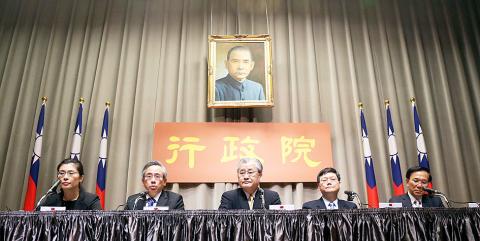President Ma Ying-jeou (馬英九) yesterday pledged to strengthen inspections on food and beverage manufacturers and severely punish those with problematic products amid a scare over adulturated cooking oils.
Presiding over the Chinese Nationalist Party’s (KMT) Central Standing Committee, Ma, who doubles as the party chairman, instructed the Ministry of Health and Welfare to hold a national food safety conference next month to address the issue.
“Food safety is a long-term issue, and the government will catch the bad manufacturers one by one and ensure food safety in Taiwan,” he said following the ministry’s report on the latest food safety scandal in which a major cooking oil company was found adulturating and mislabeling its oils.

Photo: CNA
As of Tuesday, the Chang Chi Foodstuff Factory Co had been fined NT$28.6 million (US$972,700) earlier this month, in accordance with the Act Governing Food Sanitation (食品衛生管理法), after authorities found that its products had been adulterated.
Suspicious consumers had questioned the quality of the firm’s cooking oil and tips from whistle-blowers in the company helped break the story.
Ma defended the government’s efforts to address food safety issues that have emerged in recent years, from plasticizers and toxic starch to the problematic cooking oils, and promised to increase manpower and budgets to enhance food safety.
“The problems have been there for a while, but they began to emerge only in recent years… It gives us a chance to examine the long-existing issues and resolve them,” he said.
Separately yesterday, Minister of Health and Welfare Chiu Wen-ta (邱文達), in response to repeated media enquiries on whether he would take political responsibility for alleged negligence in the food inspection process, said he “takes full responsibility for cracking down on ‘black-hearted’ food suppliers.”
“No matter when [the incidents] happened, [even] if it was my predecessor in the office, I will take full responsibility,” he said.
Meanwhile, Vice Minister of Economic Affairs Woody Duh (杜紫軍) said he disagreed with lawmakers who called for the Good Manufacturing Practice (GMP) certification — the government-backed label — be abolished on ground that the Chang Chi incident has proved the accreditation systems had been discredited.
Chang Chi was able to receive 17 GMP certifications for its edible oil products because it provided the Industrial Development Bureau with “misinformation about its manufacturing processes” to obtain the certificates, Duh said.
To address the loophole and others, the bureau is reviewing the GMP system and might require a manufacturer to present its import-export invoices and declarations and to allow on-the-spot inspection of its production lines when it seeks certification, Duh said.
The ministry will ensure that GMP is a guarantee for safety, Duh said, adding that “without the GMP system, consumers would be more exposed to unsafe foods.”
Duh said the ministry would complete ingredient testing of all 20 edible oil products advertised as 100 percent natural and unadulterated in two days and of all 129 blended cooking oil products within one week to ensure that products on the market are safe.
People who have information about suspicious food products can (02) 2325-0955, Duh said.

ANOTHER EMERGES: The CWA yesterday said this year’s fourth storm of the typhoon season had formed in the South China Sea, but was not expected to affect Taiwan Tropical Storm Gaemi has intensified slightly as it heads toward Taiwan, where it is expected to affect the country in the coming days, the Central Weather Administration (CWA) said yesterday. As of 8am yesterday, the 120km-radius storm was 800km southeast of Oluanpi (鵝鑾鼻), Taiwan’s southernmost tip, moving at 9kph northwest, the agency said. A sea warning for Gaemi could be issued tonight at the earliest, it said, adding that the storm is projected to be closest to Taiwan on Wednesday or Thursday. Gaemi’s potential effect on Taiwan remains unclear, as that would depend on its direction, radius and intensity, forecasters said. Former Weather Forecast

As COVID-19 cases in Japan have been increasing for 10 consecutive weeks, people should get vaccinated before visiting the nation, the Centers for Disease Control (CDC) said. The centers reported 773 hospitalizations and 124 deaths related to COVID-19 in Taiwan last week. CDC Epidemic Intelligence Center Director Guo Hung-wei (郭宏偉) on Tuesday said the number of weekly COVID-19 cases reported in Japan has been increasing since mid-May and surpassed 55,000 cases from July 8 to July 14. The average number of COVID-19 patients at Japan’s healthcare facilities that week was also 1.39 times that of the week before and KP.3 is the dominant

The Chinese Communist Party’s (CCP) working group for Taiwan-related policies is likely to be upgraded to a committee-level body, a report commissioned by the Mainland Affairs Council (MAC) said. As Chinese President Xi Jinping (習近平) is increasingly likely to upgrade the CCP’s Central Leading Group for Taiwan Affairs, Taiwanese authorities should prepare by researching Xi and the CCP, the report said. At the third plenary session of the 20th Central Committee of the CCP, which ended on Thursday last week, the party set a target of 2029 for the completion of some tasks, meaning that Xi is likely preparing to

US-CHINA TRADE DISPUTE: Despite Beijing’s offer of preferential treatment, the lure of China has dimmed as Taiwanese and international investors move out Japan and the US have become the favored destinations for Taiwanese graduates as China’s attraction has waned over the years, the Ministry of Labor said. According to the ministry’s latest income and employment advisory published this month, 3,215 Taiwanese university graduates from the class of 2020 went to Japan, surpassing for the first time the 2,881 graduates who went to China. A total of 2,300 graduates from the class of 2021 went to the US, compared with the 2,262 who went to China, the document showed. The trend continued for the class of 2023, of whom 1,460 went to Japan, 1,334 went to